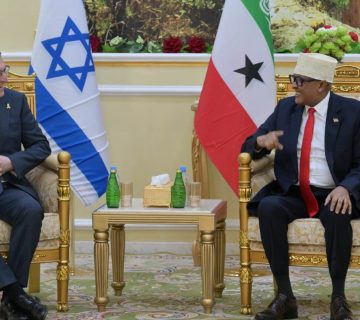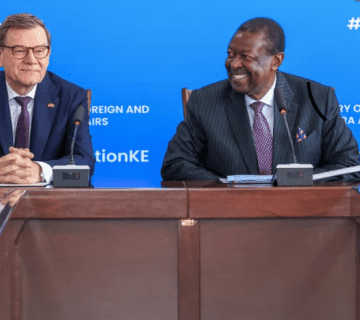The ongoing conflict in Sudan, which ignited in April 2023, has evolved into a complex struggle between the Sudanese Armed Forces (SAF), led by General Abdel Fattah al-Burhan, and the paramilitary Rapid Support Forces (RSF), under General Mohamed Hamdan Dagalo (Hemedti). As this conflict devastates Sudan, Western powers, traditionally active in global peace-building efforts, have been noticeably absent. Instead, regional actors, including the United Arab Emirates (UAE), Egypt, and Saudi Arabia, have assumed a more assertive role. Their involvement, driven by strategic interests such as access to Sudan’s resources and geopolitical influence over the Red Sea, has significantly shaped the conflict’s trajectory. This shift marks a new era of regional influence, with profound implications for Sudan’s future.
Conflict Context
To fully comprehend the current conflict in Sudan, it is necessary to examine the country’s historical context. Several historical events, particularly from the last century, set the stage for the ongoing conflict. Sudan was jointly ruled by Egypt and Britain under the Anglo-Egyptian condominium (1899-1956). During this period, British colonial governance largely neglected the southern regions, fostering a deep divide between the Arab-dominated North and the non-Arab South. After gaining independence in 1956, tensions between the North and South escalated, culminating in a civil war that lasted until the Addis Ababa Agreement of 1972, which temporarily granted the South regional autonomy.
However, peace was short-lived. In 1983, President Nimeiry introduced Sharia law in the North, alienating the largely Christian and animist South, triggering the second civil war. This war, led by the Sudan People’s Liberation Army (SPLA) under John Garang, lasted until the signing of the Comprehensive Peace Agreement (CPA) in 2005. The CPA ended decades of conflict, with Western nations, particularly the US and EU, heavily involved in facilitating peace and providing humanitarian support to the South. The South’s vote for independence in 2011 further highlighted Western diplomatic involvement.
Yet, since the outbreak of the current conflict, the international community has witnessed a stark absence of serious political and humanitarian interest from the West. This leads to pertinent questions: Why has Western engagement waned? Who is filling the vacuum, and what consequences will this have for Sudan and the broader region?
The Absence of Western Engagement and the Resulting Vacuum
The lack of significant Western intervention in the ongoing Sudan conflict reflects a broader shift in Western priorities. Western nations, traditionally active in international conflict resolution, are increasingly preoccupied with domestic issues and other geopolitical crises, such as the war in Ukraine and the escalating conflict in the Middle East. Russia’s actions in Eastern Europe and the West’s focus on supporting Israel have diverted attention and resources away from Sudan. It can be witnessed that the West is concentrating its recourses primarily on the war on Ukraine since Russia is considered as an immediate threat towards that western sovereignty, especially threatening easter European former Soviet states. As of now the international community and especially western countries did not engage in arbitrating the Sudan conflict through offering diplomatic assistance and have so far failed in showing the support that is necessary to challenge the immense humanitarian aid that is needed for Sudan’s civilian population. As a result, Sudanese factions have acted with little external accountability or diplomatic pressure. The lack of western interest towards the Sudan conflict left a gap open for other actors in the region to engage.
This vacuum has been filled by regional actors such as Egypt, the UAE, Saudi Arabia, Iran, and Libya, who have vested interests in Sudan’s political future. Egypt is, concerned with shared control over the Nile River and Sudan’s stability, and has thus supported the SAF under General al-Burhan. The UAE, seeking greater influence in the Horn of Africa and control over key maritime routes, has allegedly backed the RSF with arms and logistical support. Sudan’s location makes it a strategic ally for the UAE’s regional ambitions. Saudi Arabia, focused on maintaining influence across the Red Sea and securing its interests in Yemen, has provided diplomatic and financial aid to Sudan. Libya, especially forces aligned with General Khalifa Haftar, has a vested interest in supporting the RSF, seeing it as a regional ally in the battle for influence in Africa. Haftar’s Libyan National Army has provided arms and military support to the RSF, further entrenching external actors in the Sudanese conflict. Iran, contrary to the Gulf states, has sided with the SAF, showcasing the competing geopolitical interests in Sudan.
Impact on the Conflict and Sudan
The shift in power dynamics surrounding the Sudan conflict has had significant geopolitical ramifications. As non-Western actors, particularly Middle Eastern powers, gain influence, the region has witnessed increased instability. Countries like Egypt, Saudi Arabia, and the UAE have involved themselves in Sudan’s internal conflict, driven primarily by their geopolitical and security interests, including control over key waterways such as the Red Sea and Nile River. This shift has reduced Western diplomatic leverage, complicating future peace negotiations. Furthermore, these external actors have prioritized their strategic objectives over Sudan’s long-term stability, contributing to the exacerbation of the conflict. This has also resulted in one of the worst humanitarian crises globally, as regional rivalries and competition for influence intensify. Additionally, there is growing concern that the conflict could spillover into neighbouring regions, with East African countries like Ethiopia, Chad, and South Sudan already experiencing increased instability due to their proximity to Sudan’s unrest.
Conclusion & Recommendations
There is growing sentiment across Africa advocating for reduced reliance on Western influence and the development of autonomous conflict-resolution strategies. While regional actors could play a crucial role in Sudan’s stabilization, their interests have complicated the conflict rather than alleviating it. A multilateral conflict-resolution approach driven by African actors could potentially foster long-term peace in Sudan. However, the success of such initiatives depends on prioritizing regional stability over individual geopolitical gains. Without a shared commitment to peace, efforts to resolve the Sudanese conflict will likely continue to fail, further destabilizing the region.
Photo Credit: Bandar Algaloud / Saudi Kingdom Council /Anadolu Agency
Laurence Jost is a researcher at the Horn International Institute for Strategic Studies.
The views expressed in this article are those of the authors and they do not necessarily reflect the position of the HORN Institute.
The contents of this article are copyright of © The HORN Institute 2022. All rights reserved. Any redistribution or reproduction of part or all of the contents in any form and for whatever reason is prohibited. You may use the content of this article for personal reasons but acknowledge the author and cite the website as sources of the material.



